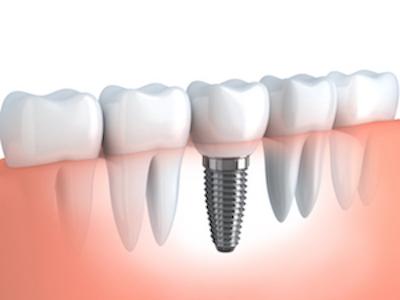Dental Implants
One of the most significant advances in dentistry in the past few decades has been the improvement and increased success in replacing natural teeth with dental implants. Whether they are used underneath dentures to improve stability, or restored with crowns or bridges to replace single or multiple teeth, they are an increasingly predictable option that we offer to patients who are facing tooth loss.
At McKnight Signature Dental, we are skilled and experienced in the treatment planning, and restoring of dental implants. 
How Dental Implants Work
A dental implant is a screw, generally made of titanium, that is placed in the jawbone and becomes solidly anchored in the maxilla or mandible. Once the patient’s bone has grown tightly around the implant body, it can be used to attach crowns or bridges or as a stabilizer beneath a denture or partial. The process of an implant’s anchoring, or osseointegration, can take anywhere from three to six months.
Can Everyone Have Implants?
In the majority of patients, implants are a very viable option for tooth replacement. Unfortunately, however, some conditions make the success of implants less predictable. Smoking and diabetes are the two most common challenges to the success of osseointegration.
History of treatment for osteoporosis with medications as well as autoimmune conditions are also things to be discussed before deciding on implant placement.
 The Process of Getting a Dental Implant
The Process of Getting a Dental Implant
We begin with a consultation with Drs. McKnight and Konz, including a thorough review of medical and dental history.
- Collection of appropriate films for identification of biological structures, i.e., sinus, nerves
- Referral to a specialist for grafting if indicated and placement of implant fixture, followed by three to six months of healing
- Placement of crown, bridge or fabrication of denture after the implant is anchored
Do Implants Hurt?
Routine placement of implants is generally no more uncomfortable than receiving a filling. Anesthesia is given to numb the gum tissue in the area, but bone has no nerves. The only discomfort after the placement of an implant is generally a little soreness in the gums in the area. Most patients only require anti-inflammatories to control discomfort.
Benefits of Dental Implants
- A single implant restores a single tooth without disturbing the health of any neighboring teeth
- Bone in the area of an implant is preserved, where it is not if a tooth is lost and left unrestored
- Dental implants have no organic material and are therefore not susceptible to tooth decay
If you have missing teeth or are facing tooth loss, please call our Leawood dental office to make a consultation appointment so we can discuss how implants can benefit you.


